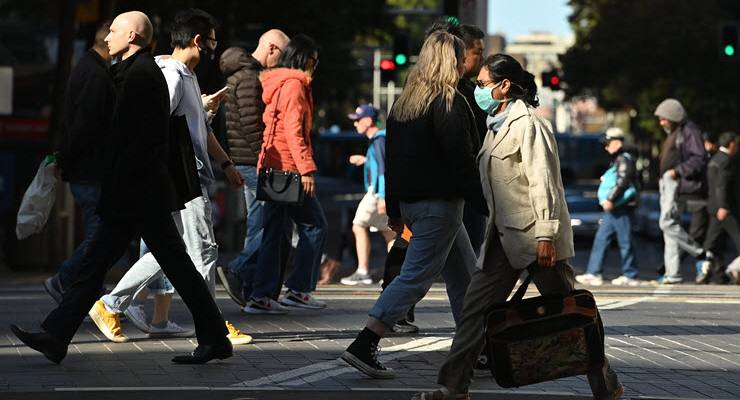
As Victoria enters stage four lockdown due to growing case numbers, with workplace transmission a significant factor, Australia is having a long overdue discussion about a pernicious feature of our modern economy — workers “soldiering on” while sick.
Increasingly insecure labour contracts, manifesting differently in various critical industries, have left many workers without sick leave and others feeling unable to use their entitlements. That this paradigm would slowly turn workplaces into petri dishes was likely even before the pandemic.
Governments are finally providing modest support for workers making healthy choices. Victoria has added a $300 payment for those who must stay home while awaiting test results to the existing $1500 for those who test positive and have no paid sick leave.
Last Monday, the Fair Work Commission awarded paid pandemic leave to aged care workers. On Wednesday Scott Morrison directed Industrial Relations Minister Christian Porter to discuss a broader paid pandemic leave policy with the union movement, though by the weekend Porter was voicing concern about the impost on business.
Such reforms are overdue and necessary. But financially supporting potentially contagious workers to stay home is not enough.
Even after coronavirus patients are no longer infectious, they may still need significant long-term support from their employers and governments. And with evidence suggesting COVID-19 could leave long-lasting health effects on many sufferers, those of us who have experienced long-term illness know too well that such support will be needed for far longer than the 14-day isolation period.
What it’s like for us ‘long-haulers‘
I suffer from chronic fatigue syndrome (CFS). Born from a rather innocuous bout of glandular fever four years ago, its fluctuating symptoms include severe tiredness, headaches, insomnia and allergies. Imagine an awful hangover that just won’t go away.
At the height of my symptoms, I continued to work while physically ill for 18 months straight. I was a casual worker at the time, with no access to sick leave.
I wasn’t a contagious threat to others, but God did it suck for me personally. There is hardly any worse feeling than trudging to work each morning when every cell in your body is screaming at you to go back to bed.
Medical researchers are increasingly confident that many coronavirus survivors will suffer persistent symptoms that are very similar to CFS.
The only peer-reviewed study of COVID-19 survivors has found over half experienced persistent fatigue months after infection. Disease expert Paul Garner caught the virus in March and still has “deeply frustrating” persistent symptoms. Survivor support groups on social media call themselves “long-haulers”.
Previous pandemic viruses have similarly caused long-term illness and fatigue, including SARS — for which only 14% of survivors had no long-term symptoms.
If many victims of this nasty disease will be adversely affected for many months, or even years, to come, temporary emergency measures won’t cut it. After sufferers burn through any extra sick leave and pay, our punishingly work-centric economic and social systems will soon make their illness a personal burden to bear.
Workplace flexibility for whom?
The Coalition is again voicing interest, as neoliberals have for decades, in increasing “flexibility” in our workplaces. We should ask, “flexible for whom?”
Workers who suffer from long-term illnesses desperately need flexibility at work to accommodate fluctuations in their symptoms and thus their ability to work. They need the freedom and long-term support to vary their rosters based on their present capacity, to take more breaks, and to vary their tasks so they contribute to the enterprise in a mutually beneficial manner.
Others who are unable to work would appreciate greater flexibility from Centrelink, the National Disability Insurance Scheme and other agencies to only comply with mutual obligations when they have the capacity to, and to not become tied to arbitrary, unsuitable standards.
I got through the worst period of my illness through the flexibility of my former employer. My managers supported varying my hours and evening out my workload to prevent burnout. Without their intervention, I would likely have had to quit and line up at Centrelink.
But I doubt this is the kind of flexibility the Coalition has in mind. It is most often a flexibility for employers to impose inflexible conditions on their employees. The flexibility of some to make life more rigid and unaccommodating for others.
The Coalition’s preference for more short and zero-hour contracts will not only exacerbate the spread of diseases but also make it harder for long-term sufferers to alter their hours to suit their needs. And its recent cuts to JobSeeker will diminish the capacity of “long-haulers” to take time out of paid employment when they need to.
I applaud state and federal governments for providing more temporary relief for the sick. But broader solutions will be needed for long-term sufferers to find a sustainable “COVID normal”.








Crikey is committed to hosting lively discussions. Help us keep the conversation useful, interesting and welcoming. We aim to publish comments quickly in the interest of promoting robust conversation, but we’re a small team and we deploy filters to protect against legal risk. Occasionally your comment may be held up while we review, but we’re working as fast as we can to keep the conversation rolling.
The Crikey comment section is members-only content. Please subscribe to leave a comment.
The Crikey comment section is members-only content. Please login to leave a comment.